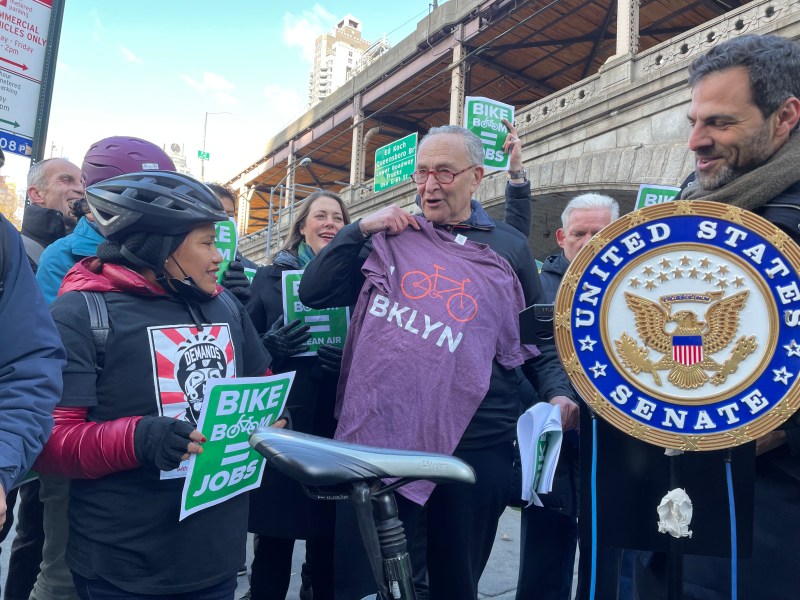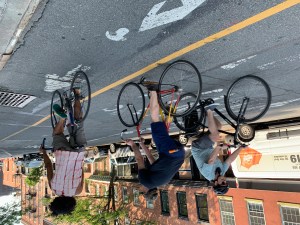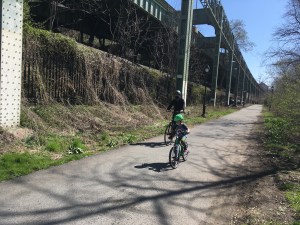Schumer: NYS Will Get ‘An Effing Lot Of Money’ For Street Safety And Cycling

New York is about to get so much money for safe streets from the federal government that our leaders are almost swearing in amazement.
Senate Majority Leader Chuck Schumer and a cast of dozens showed up at the base of the Queensboro Bridge on Tuesday to break the news that city cycling could reap a windfall of federal fun bucks in the years to come.
“How much will New York get — $289 million for bike infrastructure,” Schumer said at a press conference celebrating the street safety aspect of the recently passed federal Infrastructure Investment and Jobs Act. “That is an effing lot of money.”
The federal infrastructure bill boosted the amount of money that goes towards the federal “transportation alternatives” grants, and also created a new pot: a $200-million-per-year Safe Streets For All program that will support Vision Zero efforts in cities and states across the country. Schumer hoped the money, and the city’s bike boom, will end up making New Amsterdam look like Old Amsterdam (and not for the widely celebrated space cakes).
“That’s what we’re having here in New York, a bike boom. Unfortunately, the infrastructure hasn’t caught up with the boom,” said Schumer, who is a regular bike rider. “We are here to say we need much more infrastructure to make biking, more prevalent, safer, cleaner and better in New York. … My goal, my dream is to be like Amsterdam. I visited Amsterdam, bikes are way of life there. And it’s a beautiful way to live. New York has to aspire to that.”
State and city leaders will have to wait a few months before the money shows up, since Schumer said that legislators still need to write regulations governing what kinds of things the money can be spent on in order to say, prevent the state Department of Transportation from deciding that widening a highway through Oswego is somehow a Vision Zero or an alternative transportation project. But the state’s senior Senator said that he was committed to writing regulations that lock the street safety and cycling-friendly provisions into law so that disaster scenarios don’t happen.
Advocates were happy to point out where they thought the money could be most useful.
“I don’t want to hear our city and state tell us they can’t to build the infrastructure to keep us safe ever again,” said Transportation Alternatives Queens Organizer Laura Shepard. “We need solid, physically protected bike lanes on our dangerous arterials and we need to build out our greenway network to connect every neighborhood.”
Shepard laid out projects big and small that she thought the money could do well to help with. Hardening known dangerous arterial and speedways like the Honeywell Bridge, where cyclist Thomas Panto was killed in October while riding in a bike lane that was on the city map as protected, yet the city declassified it as “protected” after its flimsy plastic barriers were destroyed. Bringing safe bike and pedestrian access to the MTA’s bridges, speeding up the city’s work on converting the Queensboro Bridge’s south outer roadway to a pedestrian path and a host of greenway work in Queens that’s been left undone.
Greenways were also on the mind of another city bike advocate, especially the city’s grand 350-mile plan for one that’s gone mostly unfulfilled.
“One proven way to spend well is to invest in greenways,” said Bike New York Director of Policy and Advocacy Jon Orcutt. “The city has a greenway plan from 1993, and very little of it has been built.”
Orcutt also said that Uncle Sam could foot the bill for exciting new developments in protected bike lanes.
“More money is good and gives us more potential and more reasons to push dot for better infrastructure, not barely-protected bike lanes we can hardly use. We should use some of the funding to reboot what we call protected bike lanes, and study other designs for them so that cyclists can use them rather than ride into and around parked cars and trucks,” he said.

